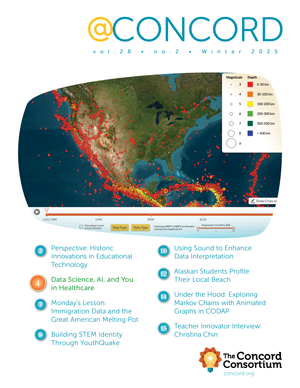Innovator Interview: Sarah Haavind

Almost three decades ago, drinking coffee in a local café with friends, Sarah never imagined this collegial coffee klatch would lead to a long-term relationship with the Concord Consortium. The group included Concord Consortium founder and visionary Bob Tinker, and it still convenes annually. During the intervening years, Sarah has served on Concord Consortium’s Board of Directors, contributed to the groundbreaking Virtual High School, co-authored a book about online facilitation, taught at every level from grade school to college, lived on both coasts, and earned an Ed.D. She is now working on our InSPECT and InquirySpace projects, where students do science like scientists do science, which she describes as “Bob’s legacy.”
Before joining the Concord Consortium, in 1997, Sarah worked at Bolt Beranek and Newman (BBN), even though she had once picketed in their parking lot (“No nukes!”) because they were engaged in government war programs. But their education technologies department hired her to develop problem-based learning CD-ROMs about EarthWatch field studies. She’s still passionate about Orca whales of the Pacific Northwest as a result. “They’re matrilineal, live to their nineties, and swim in familial lines. They’re extraordinary,” she laughs.
This was the incredible era in which BBN was working on the nascent Internet. One of her colleagues then, Andee Rubin, who ironically now serves on the InquirySpace advisory board, first presented to her team the potential of the Mosaic browser for education. The Internet subsequently launched a revolution in business, communications, and education. Sarah has been fortunate to work near prescient technologists. (A Los Angeles Times article dated August 25, 1970, pinned to her office bulletin board, quotes her farsighted father, Electronics magazine editor Bob Haavind, “Home computers likely in U.S.”)
In 1996, Sarah was at the forefront of a new wave of technology. She co-authored with Bob Tinker one of the earliest articles on “netcourses.” Their work resulted in a grant from the Department of Education to develop the Virtual High School (VHS), which led to the seminal book Facilitating Online Learning: Effective Strategies for Moderators that Sarah co-authored.
Fascinated by the value of online learning communities, Sarah completed a doctorate at the Harvard Graduate School of Education focused on online collaborative pedagogy at VHS. In the earliest days of online courses, she observes, people wrote “long letters” that were inefficient for others to read and for the development of deep conversations. So she conceived a new framework for online conversations that would deepen naturally towards collaborative learning with text-based discussion.
She’s now putting her skills into practice in InSPECT, which is creating affordable IoT (Internet of Things) sensors and software to help students learn to produce their own data, rather than passively collect data. “If you want students to tinker and figure out what data to produce, then you need to rewrite the curriculum and the role of the teacher,” she says, “keeping learner agency with the student and relearning your role as someone supporting that.” As a project researcher she loves scouring classroom videos and pinpointing the moment the teacher asks a reflective question and the student (sometimes while manipulating a sensor in their hands, which she describes as “kinesthetic learning”) has an aha! discovery.
The goal of both InquirySpace and InSPECT is for students to use technology that enables them to experience their own agency as scientists. “That’s what got Bob up in the morning,” Sarah says. And it’s important to her to continue his legacy. In 2019 she returned to the Concord Consortium full time: “I just feel like I’m at the right place. I’m home.”
